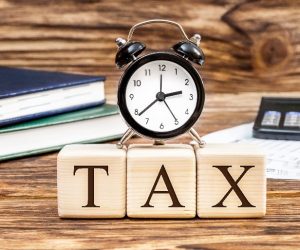Tax Day is quickly approaching. National Tax Day is April 15th, and business taxes should be filed by now unless you have filed for an extension. Owning your own trucking business can make it difficult to understand how you are taxed, the type of taxes you need to file, or what you can use as a tax deduction. To avoid paying a large lump sum at the end of the year for your taxes, it is advised to take 20-30% of your net income and pay quarterly to the IRS. Paying the IRS quarterly helps avoid any tax penalties and having any surprise expenses on Tax Day.
Types of Taxes
There are two different tax types that as a business owner may need to file. These include
Federal Income Tax and State Income Tax – as an employee, these taxes are withheld from your paycheck. However, as an owner-operator, you become responsible for calculating these taxes based on your monthly check. To determine how much you should withdraw from your check, you can refer to the Tax Bracket at www.tax-brackets.org.
Self-Employment – when you are not classified as an employee, self-employment is like Social Security, and Medicare is deducted from an employee’s paycheck. The breakdown for these taxes is Social Security 12.4% and Medicare 2.9%, totaling 15.3%.
Tax Deductions for Owner-Operators
Whether you own your own trucking business or you lease from a trucking carrier, you are still responsible for deducting your personal taxes. Knowing what can be tax-deductible for owner-operators can help save you money and prevent you from overpaying to the IRS. It is important to remember throughout the year to keep receipts of any business-related expenses in the event the IRS audits you. You must be able to show proof of these costs to deduct them from your taxes. Below, we have listed a few common business tax deductions for owner-operators.
- Bank, Credit Card, or ATM Fees – only fees related to your business can be deducted. Be sure to keep receipts as proof.
- Business Loans or Mortgages – you can use the interest on these loans as a tax deduction.
- Devalue in Property – any trucking equipment that loses its value over the years, such as trailers, trucks, computers, copiers, fax machines, or furniture, can be used as a tax deduction.
- Financial Loss – if you have damaged equipment from either weather or an accident, you can write off some of these expenses.
- Fuel – if you pay for your fuel or have fuel card fees, these can be deducted.
- Government Fees, Licenses, and Permits – you can deduct half of your self-employment tax. However, weight violations, tickets, or other penalties paid to the government cannot be used.
- Home Office Supplies – to use office supplies as a tax deduction, this must be the central location in which you use to run and manage your business.
- Insurance Premiums – this includes company and personal paid insurance plans.
- Internet and Phone Bills – monthly charges for internet and phones used to operate your business can be deducted up to 50% of the bill.
- Leasing – if you have a lease agreement, 100% of your truck payments can be tax-deductible. However, the security deposit cannot be deducted.
- Maintenance – any maintenance or cleaning bills for your truck can be used as a tax deduction. If you do your repairs, you can still deduct the amount used for parts, but labor cannot be deducted.
- Per Diem – According to the IRS – you can deduct a per diem of food expenses, motels, and other necessary expenses while over the road. It may be easier to opt-in rather than save all your food and lodging expenses. In 2015, the IRS deemed per diem for self-employed drivers was $63.00 a day. However, if you run for a carrier, you can only deduct out-of-pocket expenses that are not reimbursed by your carrier.
- Retirement Plans – this can also include an IRA or a Keogh plan that is for you and your spouse.
- Satellite Radios – many truck drivers use satellite radios in their trucks for traffic information and weather notifications. The monthly subscription for the radio can be deducted from your taxes.
- Uniforms – if you are required to wear a uniform for your job, you can deduct these expenses from your tax return. Also, the costs incurred while over the road to do laundry can be used.
Common Owner-Operator Tax Deduction Questions
Figuring out how to file your taxes and what can be used as a tax deduction for owner-operators can be confusing and frustrating. However, below is a list of common questions and answers regarding owner-operator taxes and deductions.
- How much needs to be set aside for my trucking business?
The IRS recommends that a business owner withhold 25-28% of your weekly net income for your taxes, and this should be paid to the IRS quarterly. - What should I do if I cannot file my taxes by the deadline?
If you are unable to file your taxes by the deadline, you can request an extension. This is not an extension to allow you more time to pay. Instead, it just gives you more time to get your documents ready to file. - As a business owner, will I receive a tax return?
Receiving a tax return will depend on your unique situation. However, it is uncommon for a business owner to receive a tax return. In the case you do receive a return, this could be because you paid too much quarterly. - How do I get my 1099 MISC?
Your carrier will send you the 1099 MISC form to file your taxes. - What happens if I do not pay quarterly taxes?
If you do not pay quarterly to the IRS, you are subject to underpayment penalties and interest on all payments not paid. - As an employed team driver, what forms do I need to send?
If you have employees (employed team drivers), you should have them set up on a payroll account and send W-2s at the end of the year. However, if you have a contractor, you will need to send them a 1099-MISC. - Do owner-operators and company drivers need to file different tax returns for earnings?
As an owner-operator and a company driver, you do not need to file different tax returns. Instead, you will submit Form 1040. This form will include your Schedule C, business earnings, and expenses. - Can e-log be used for Per Diem?
You can use your e-log records if you have a years’ worth of information. To get this information, you may contact your carrier every four months for a copy of your e-logs. Many companies do not keep logs for longer than six months. - Do I need to file separately from my spouse?
If you are legally married, you have two options when filing your taxes. You can either file Married Filing Jointly or Married Filing Separately. - Can I claim a parent as a dependent?
To claim a parent dependent, you must provide more than half of the individual’s costs. These costs can include lodging, food, housing, medical, or clothing expenses.
Do not wait until it is too late to file your taxes. Doing so can risk the chance of inuring penalties from the IRS. If you have questions regarding your self-employment or owner-operator income tax, refer to the IRS website or speak with a tax professional.




 For owner-operators, the time is coming to file and pay taxes. The IRS made a statement that all owner-operators have until August...
For owner-operators, the time is coming to file and pay taxes. The IRS made a statement that all owner-operators have until August...

